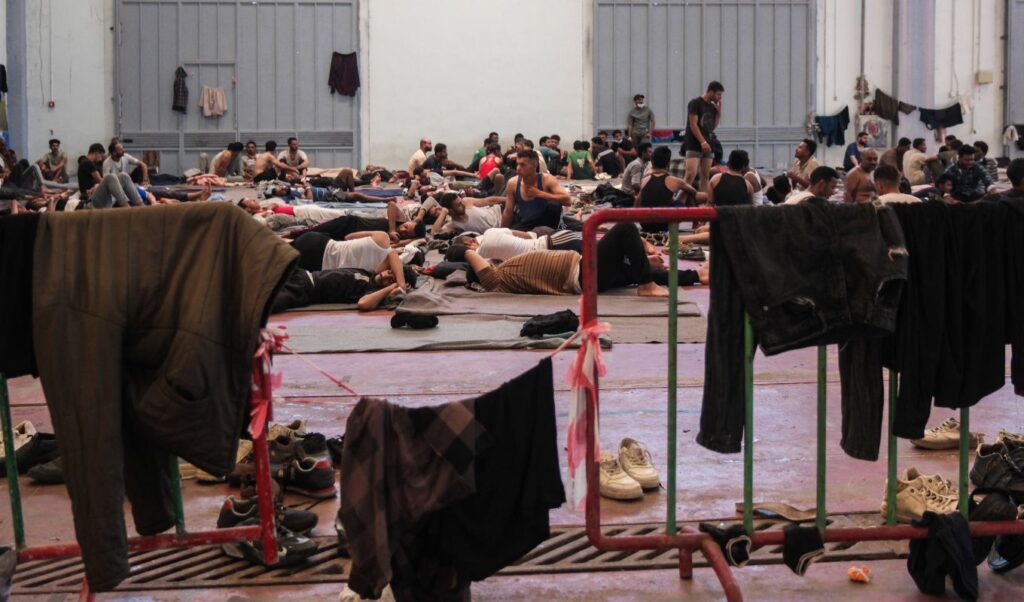The implementation of a new deterrent framework for migration from Libya to Crete is now the only way forward, according to Migration and Asylum Minister Thanos Plevris. The new framework stipulates that illegal migrants will not be able to file asylum applications, but will instead be placed in detention and return procedures without registration.
“No penalty is imposed without law”, nor is the fundamental Article 7 of the Constitution suspended except in cases of “immediate threat to national security” (Article 48 on states of emergency). However, the fact that millions of people, nationals of third countries, are waiting to board the death boats of despair and move toward Greece to overturn Europe’s cultural identity is unthinkable not to suppress.
Thanos Plevris: You are not welcome in Greece – Stay where you are
Diplomatic margins have been minimized, while operational options are also considered limited. The implementation of the new deterrent framework now in effect is summarized in the proposal by Migration and Asylum Minister Thanos Plevris: “The illegal migrant will not be able to file an application, will not enter asylum procedures, but instead will be placed in detention and return procedures without asylum registration“.
The message to illegal migrants is clear: “You are not welcome in Greece. Stay where you are. If you manage to enter Greece, we will imprison you, and your only way out will be your return. You’re wasting your money on smugglers”.
As immediate measures to stem the invasion from North Africa, we prioritized the suspension of asylum applications, arrest and detention, and return of those who enter illegally. Additionally, with the passage of the illegal migration bill, anyone who has entered illegally will now be sentenced to imprisonment without suspension, meaning their choices will be two: either prison or return
The numbers of migration from Libya to Crete
The numbers are relentless and prove the need for implementing such measures. The extent of the Libyan coastline exceeds 1,770 kilometers, while the shores of Southern Crete, including small islands, amount to 280-300 kilometers.
Security services report that the 9,800 illegal migrants detected since last Sunday are likely double or even multiple times that number due to the vastness of Cretan territory. Additionally, the maritime distance of 103 nautical miles from the port of Tobruk in Eastern Libya to Crete makes any thought of Coast Guard intervention prohibitive.
Millions of migrants in Libya awaiting passage
The country, divided into warlord regimes, estimated at the beginning of the week that 3-4 million migrants are waiting on its shores to cross to Europe. Furthermore, according to reports from senior Foreign Ministry officials:
- 5 million Sudanese have crossed from neighboring Egypt to Eastern Libya
- 9-11 million Egyptians use the same route to escape to Greece
- The Cairo government has signed an agreement since 2017 for migrant retention
It is noted that 70% of illegal migrants are Egyptian, a fact that raises multiple questions about the exercise of instrumentalization politics against the EU and by extension Greece.
The situation in Libya and the challenges
In any case, the Benghazi regime of Khalifa Haftar and his family, since it is not recognized by any international organization, has no obligations and is not accountable anywhere for its actions.
So far, those coming from Sudan are minimal and the only ones entitled to asylum, as the country has been experiencing civil war since 2023. They do not have the ability to pay $8,000-10,000 to be released from Libyan concentration camps.
In reports by the International Organization for Migration (IOM) from semi-official registrations of the Libyan mechanism, it is stated that the overwhelming majority (83%) comes from four countries: Sudan (31%), Niger (22%), Egypt (20%) and Chad (10%). More than three-quarters (76%) do not have access to healthcare.




